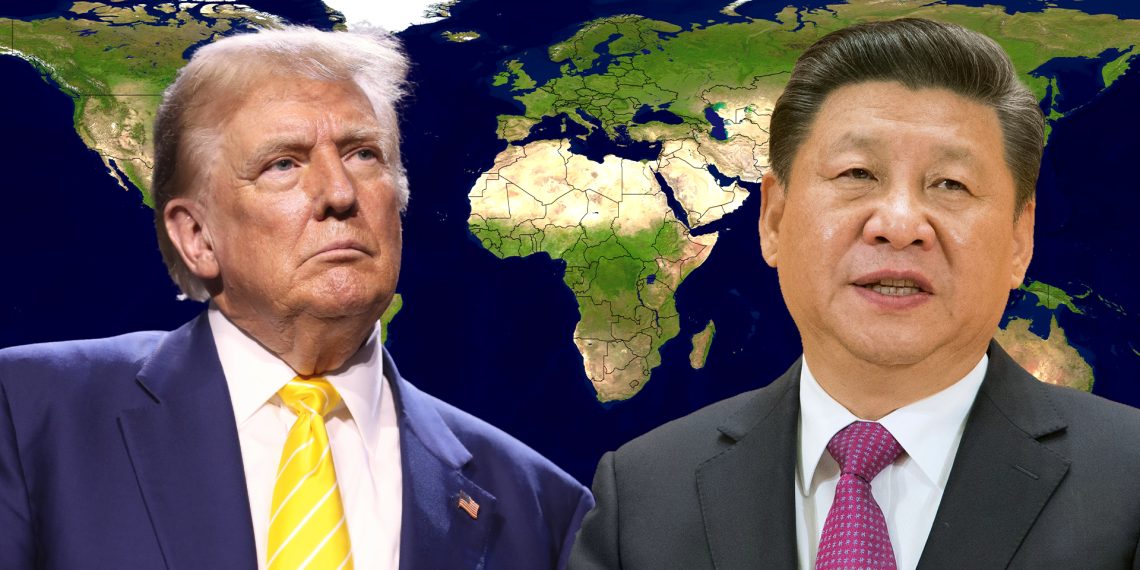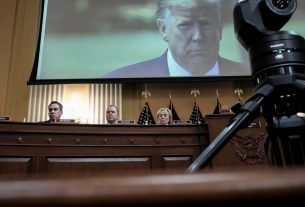In recent decades, China has massively expanded its influence on the global stage—with the goal of reshaping the international order. But what exactly lies behind this claim, and what consequences does it have for Europe, the global power USA, and global power distribution? Kontrast spoke with sinologist Doris Vogl, who analyzes different facets of this transformation. The discussion highlights, among other things, China’s dominance in Africa, Europe’s declining influence, and the role of human rights in a changing world order.
Kontrast: What exactly does it mean when China emphasizes that they want to establish a new world order? What does the Chinese government criticize about the existing order?
Doris Vogl: When China speaks of a new world order, the attributes “fair”—or in English just—as well as diplomacy on equal footing and multipolarity are always mentioned. These are the three aspects that China includes in its official rhetoric about a new world order.
Kontrast: What does that mean in concrete terms?
Vogl: Multipolarity means that there are several geopolitical centers of power—not just one or two. And by just, however one may translate it, China understands a better standing for developing countries in international organizations. Not only in UN bodies, but especially when it comes to the MDBs, the Multilateral Development Banks. (Multilateral Development Banks stabilize the global financial system by supporting developing countries with long-term financing for modernization projects that promote growth, Ed.) The standing of developing countries there is poor. Understandably so, since these countries are borrowers, not lenders.
Another point very important to China is the reform of the international financial system. In terms of currency policy, too, China seeks a new world order. China sees it as a matter of “justice” when sanctions can no longer be imposed through the monopolistic position of the US dollar. This happens mainly through the SWIFT system (SWIFT provides a network that enables secure transmission of payment orders between banks, Ed.).
China’s shift away from the US dollar
Kontrast: What are China’s interests?
Vogl: For decades, China has pursued a de-dollarization course in currency policy. For over ten years, China has been selling off its dollar reserves. The aim, strictly speaking, is to strip the US and its allies of their financial leverage and their geopolitical influence.
Kontrast: Why?
Vogl: There are numerous publicly available analyses by Chinese political scientists stating that sanctions against individual countries ultimately do not affect governments, but the civilian population. And here, China presents itself as a representative of the people on the global stage. I am referring to the narratives and the official rhetoric of China. This is not political reality—I am speaking of the official narrative.
Kontrast: What is the reality?
Vogl: For several years now, China has stopped publishing statistics on the Gini coefficient (which measures how unequally wealth or income is distributed in a country, Ed.). For many years, the national Gini index was published annually. They even allowed foreign institutions to take part in the analysis. But when the income gap between different Chinese population groups began widening, suddenly there were no more Gini statistics. So when it comes to income distribution, the People’s Republic does not shine at all. Income inequality has been increasing for years. At the same time, Beijing ideologically maintains that the overall well-being of the broad population must always be the primary focus—not the privileges of elites.
China as a counterweight to Western dominance
Kontrast: Can we say that China strives to replace the USA as the leading world power?
Vogl: That is the American narrative: “China wants to replace us.” China has, for decades, propagated the opposite narrative: “We have no desire to replace the US, because we will not act as a geopolitical hegemon. We represent the Global South on equal terms.”
China criticizes the outdated dominance of Western states in international organizations. That is one criticism. Another, as China puts it, is NATO’s expansion strategy into the Asia-Pacific region.
The role of BRICS Plus
Kontrast: China is often mentioned in the context of geopolitical counterweights in connection with the BRICS Plus alliance. To what extent can BRICS Plus be interpreted as an expression of China’s efforts to establish an alternative international order to Western-dominated institutions?
Vogl: BRICS Plus is primarily an instrument designed to have monetary and financial impact on a global level. Looking more closely, many BRICS Plus countries—when it comes to bilateral trade, meaning financial transactions between BRICS Plus members—are already further ahead than the EU. They conduct payments in their local currencies via purely digital transfer mechanisms. Within BRICS Plus, there exists a very advanced transfer system that the European Central Bank is only now beginning to develop.
BRICS Plus Alliance
BRICS Plus is an alliance of rapidly growing economies pursuing economic cooperation. Since January 1, 2024, the founding members Brazil, the Russian Federation, India, China, and South Africa have been joined by Egypt, Ethiopia, Iran, and the United Arab Emirates. In early 2025, Indonesia joined as well. In 2023, BRICS Plus countries represented more than 48% of the world’s population and generated about 39% (2024) of global GDP.
It is a very important part of China’s efforts to help shape the international order, especially given the numerous applications for BRICS Plus membership. Argentina dropped out as a candidate. The US, under Milei’s presidency (President of Argentina, Ed.), succeeded in this, because Argentina would have been a significant BRICS Plus member in Latin America. The recent accession of Indonesia and the new BRICS Plus partners Thailand, Vietnam, Malaysia, and Kazakhstan, however, shows a regional reorientation. China is now focusing primarily on economically strong Asian countries.
Kontrast: What does it mean if more and more countries join the BRICS Plus alliance?
Vogl: Take oil exports as an example: these are increasingly carried out within BRICS Plus countries and often no longer in dollars. This spells the end of the petrodollar (money in US dollars earned from oil exports, since the global oil trade is almost exclusively conducted in dollars, Ed.). That’s the first point.
Second: Western sanctions will no longer be as effective as they have been in past decades. This already became apparent during the war in Ukraine.
The European sanctions did not have the impact Brussels had expected. BRICS Plus is not the sole reason for this, of course—dozens of other factors are at play. But in the sanctions against Russia, many monetary measures were included that noticeably lost effectiveness within BRICS Plus.
Between rhetoric and reality – China’s non-interference policy
Kontrast: China always accuses the West of interfering in internal affairs. What exactly does the People’s Republic mean, and what do they do differently?
Vogl: The principle of non-interference in internal affairs is, strictly speaking, a very old foreign policy principle of the People’s Republic of China, dating back to the Bandung Conference in the 1950s. On a diplomatic level, we can call this a foreign policy mantra. In realpolitik, the situation is different. The People’s Republic did practice non-interference for decades. But if we look closely at some of China’s economic and foreign policy measures in recent years, it is clear that this principle has become increasingly porous. I do see interventions from the Chinese side.
Kontrast: Such as?
Vogl: Primarily economic sanctions—though these measures are never officially called sanctions. But policymakers in Beijing know very well that certain measures will have massive effects in the affected countries, for example in agriculture or fisheries.
China’s customs authorities are very resourceful in this regard: suddenly salmonella or other harmful residues are “found” in goods, and then an import ban is imposed—ostensibly for hygiene reasons. But it is never officially announced that these are sanctions.
The “rise” of Asia – how the world order is changing
Kontrast: What role does the current trade dispute between China and the USA play in the context of a new world order?
Vogl: This trade dispute began under the first Trump administration—after the November 2016 elections. Trump took radical measures in his first term, but also rolled some of them back quickly.
Ultimately, there were several deals between China and the US, still under the first Trump administration. What we see now reminds me of that first term: announce strong measures, implement them, and sometimes roll them back.

Kontrast: So, would you say it doesn’t really influence the emergence of a new world order?
Vogl: I see it more as a reaction of the economic power that is losing ground—namely the US. A leading economy now realizes: “We are losing economic ground and must fight back vigorously. Not just defensively, but also offensively.”
So I view the US-China trade conflict less as an “influencing” factor in an ongoing process and more as a reaction to a dynamic already underway—the changing of world orders. Strictly speaking, this “new world order” is not only about China. Political scientist Kishore Mahbubani has for years spoken of the 21st century as the “Asian Century.”
It is truly about the rise of an entire region. Most Asian countries are on the economic rise—Malaysia, Indonesia, Vietnam. In China’s case, this dynamic is most visible.
Europe’s declining influence in world politics
Kontrast: And what does this mean for Europe?
Vogl: Europe is increasingly becoming a geopolitical sideshow. European decisions once carried geopolitical weight. Those days are gone.
We have also lost normative influence outside Europe, particularly the European peace project has suffered.
Europe has not managed to end the war in Ukraine or achieve a peace initiative with Russia. Brussels has failed here. Personally, I never thought this war would last this long. Europe cannot even bring about a lasting ceasefire in its own region. Even though many Asian countries identify Moscow as the aggressor, they observe the years-long war situation very closely and interpret it as a sign of European weakness.
Kontrast: In which regions and areas has China’s geopolitical influence grown particularly strong?
Vogl: Clearly in Africa.
Kontrast: How so?
Vogl: In terms of digitalization, Chinese providers Huawei and Xiaomi dominate in Africa. Over the past 15 years, China has also built a dense radio and TV network on the continent. The global CGTN program (Chinese state-owned international TV channel, Ed.) includes almost all African languages. Numerous Confucius Institutes (educational institutions financed by the Chinese government to promote Chinese culture and language, Ed.) have also been founded in Africa. There, they primarily serve vocational functions and offer Chinese language courses.
Kontrast: What is China’s goal with this?
Vogl: The official motto is: “Winning friends.” In public speeches, China constantly invokes its decades-long “friendship with African countries.” But the real aim is to win over African elites in order to secure better business opportunities. Ultimately, this goal is based on economic calculation: we need resources, and we count on your markets as Chinese export markets.

Kontrast: What role does the “New Silk Road” play in this?
Vogl: A very essential one. Though more recent statistics clearly show that China has scaled back its major infrastructure investments in Sub-Saharan Africa—and this has been the case for years. Investments are now increasing in more lucrative countries, such as the Gulf states.
New Silk Road
The New Silk Road is a global infrastructure and investment project designed to expand China’s trade routes westward. China invests in infrastructure projects such as roads, railways, bridges, and pipelines. Partner countries are offered Chinese loans to finance such projects. Construction is typically carried out by Chinese companies.
Kontrast: Did they scale back because it wasn’t as profitable as originally thought?
Vogl: The problem, as expected, was that many African states could not service their loans. The new flagship projects of the Belt and Road Initiative now all focus on green energy and digitalization. The era of large-scale infrastructure projects is already over. Perhaps there will still be expansions of deep-sea ports and associated railways into the interior. Again, this serves China’s economic interest: exporting Chinese goods cheaply and shipping raw materials back to China.
Kontrast: What influence does China exert on Europe?
Vogl: I would say there is no direct interference. But China is increasingly a competing economic power and has reduced global market opportunities for top products from the European Union. By now, China also offers high-tech products, at lower prices. Wages are lower, working hours longer, energy costs cheaper. China has become a very strong competitor for Europe in the global market—in Africa, Latin America, or elsewhere. Chinese companies bid on global mega-projects, and in many cases, they win, leaving European companies empty-handed.
Kontrast: In your opinion, what would the global consequences be if China really did replace the US as the leading world power?
Vogl: The US narrative is: “China threatens our democracy, our democratic institutions, our free, liberal way of life.” The European narrative is much more rational. For Europe, the focus is mainly economic security. I assume China will not be the only one to rise to economic leadership. Along with China, other countries will move up economically—some BRICS Plus countries, for example.
Climate change as a risk for economy and stability
However, I don’t foresee a future where Europe and the US decline while China stands alone at the geopolitical top. I rather expect a kind of front of new economic powers—though not “front” in a military sense. China is currently also struggling to stabilize its economy. Its macroeconomic problems are not small. The same applies to the effects of climate change, considering the increase in natural disasters in China in recent years. There have been devastating floods causing billions in damages, as well as drought disasters.
I see climate change as a massive uncertainty factor for the coming years. This factor is hardly included in geopolitical analyses. In my view, forecasts of countries’ future economic development need to be reconsidered. Is a country located in a heat zone? Is sea-level rise a significant threat? Will capitals become uninhabitable? Will the energy demand for air conditioning rise to the point of overloading power grids? In my opinion, all these questions will very soon play a geopolitical role.
Climate change may hinder the development of national economies in the future and trigger rapid government changes.

Kontrast: You spoke of a front of new economic powers. What influence could this group’s dominance have on international norms—for example, with regard to human rights?
Vogl: The ASEAN example (Association of Southeast Asian Nations, Ed.) clearly shows a non-Western view of human rights. In ASEAN’s human rights declaration, as in China’s case, the right to development is emphasized. Consideration of a country’s cultural particularities in implementing human rights is also stressed. Of course, cultural factors may conflict with valid human rights standards. So even today we are facing a partial “watering down” of universally valid human rights.
Looking at most ASEAN member states, the human rights situation is clearly poor.
Kontrast: In what way?
Vogl: Take, for example, the annual Amnesty International country reports on Malaysia or the Philippines—not to mention Brunei, Cambodia, or Myanmar. In Asia, human rights standards are prioritized differently: collective rights are placed above individual rights.
In Europe, we have lost the power to impose our human rights model globally. Political scientist Ivan Krastev has made it very clear in his book The Light That Failed that Western European ideas and values have already lost significant appeal in Southeastern and Eastern Europe over the past two decades. So how could we still assume that we remain a “beacon” of individual values worldwide?
But this is not only about China. In this context, Chinese influence is often overstated. Take the Philippines: its political leadership is clearly anti-Chinese. Yet the human rights situation is poor there as well. Nor has the US Navy’s expansion of its bases in the Philippines improved the human rights situation. But it would also be wrong to claim that the Philippines has adopted China’s human rights model. That is definitely not the case.
Doris Vogl is a sinologist and lecturer on international politics with a focus on Asia at the University of Vienna. Her research focuses on China’s geopolitical role, China-ASEAN relations, and European security policy.
The rights to the content remain with the original publisher.



